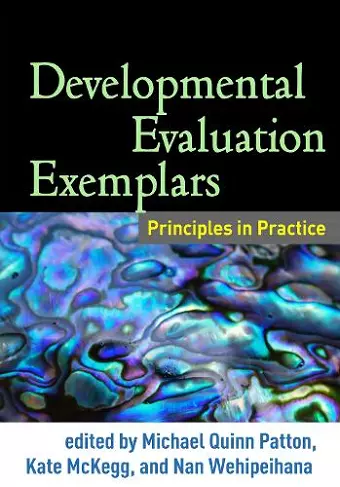Developmental Evaluation Exemplars
Principles in Practice
Michael Quinn Patton editor Kate McKegg editor Nan Wehipeihana editor
Format:Paperback
Publisher:Guilford Publications
Published:30th Nov '15
Currently unavailable, and unfortunately no date known when it will be back
This paperback is available in another edition too:
- Hardback£64.99(9781462522972)

Responding to evaluator and instructor demand, this book presents a diverse set of high-quality developmental evaluation (DE) case studies. Twelve insightful exemplars illustrate how DE is used to evaluate innovative initiatives in complex, dynamic environments, including a range of fields and international settings. Written by leading practitioners, chapters offer a rare window into what it takes to do DE, what roles must be fulfilled, and what results can be expected. Each case opens with an incisive introduction by the editors. The book also addresses frequently asked questions about DE, synthesizes key themes and lessons learned from the exemplars, and identifies eight essential principles of DE.
See also Michael Quinn Patton's Developmental Evaluation, the authoritative presentation of DE.
"Central to this book is the notion that DE is principle-driven (a most refreshing change away from ‘best practices’). DE is about learning and adjusting innovations for systems change, providing a basis for evaluations that embrace adaptation as conditions shift. Whether you are an evaluation student, instructor, or practitioner, the cases will help you learn your way into DE. Use them as part of your ongoing apprenticeship, as DE is learned through practice. You will appreciate the emphasis on the readiness conditions needed for DE to flourish. For anyone committed to participatory inquiry and action research, this book will become a trusted companion."--Ricardo Ramirez, PhD, independent researcher and evaluation consultant, Guelph, Ontario, Canada
"The contributors delve into the 'whats,' 'whys', and 'how-tos' of this powerful, adaptive model of evaluation. Chapters highlight key conceptual linkages to systems thinking and complexity theory and show how these ideas can come to life with community stakeholders and policymakers. The case studies are a treasure trove of powerful stories, practical guidance, and teaching tools that bring DE to life across populations, cultures, settings, and nations. Developmental Evaluation Exemplars represents a significant advancement in the theory, methods, and practice of evaluation and systems change."--Rebecca Campbell, PhD, Department of Psychology, Michigan State University
"The field has been waiting for a book like this one. A well-balanced, diverse set of authors focus on good examples of DE practice. The book shows how innovative projects and programs require evaluation practices and approaches that honor complexity, flexibility, and systems thinking. It describes with clarity how DE actually happens in complex ecologies and settings across the globe. This book is written for any serious student of evaluation at the graduate or postgraduate level. I am very happy to add it to my shelf of required and recommended materials for my classes in education policy and evaluation."--Rodney Hopson, PhD, Department of Educational Psychology, University of Illinois at Urbana–Champaign
"This book demonstrates that DE is not just about applying tools and methods; it's about how evaluators can think more creatively, critically, strategically, and rigorously. It’s also about building trusting, credible, ethical relationships. The exemplars will challenge you to bring forth your best thinking and relating as an evaluator."--Beverly A. Parsons, PhD, Executive Director, InSites, Fort Collins, Colorado - An excellent resource for anyone who needs to use this type of evaluation method.--Doody's Review Service, 2/29/2016
ISBN: 9781462522965
Dimensions: unknown
Weight: 600g
324 pages